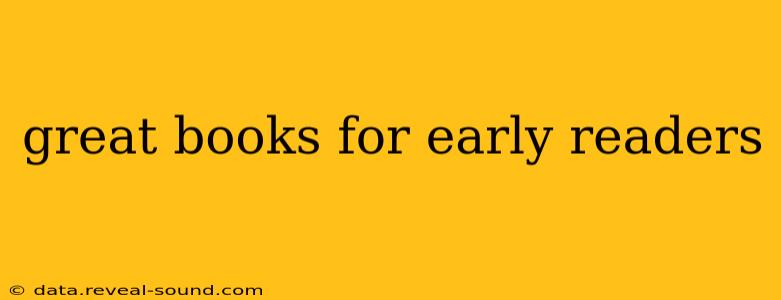Choosing the right books for early readers is crucial in nurturing a lifelong love of reading. Finding engaging stories with appealing illustrations is key to keeping young minds captivated and eager to learn. This guide provides a curated selection of excellent books, categorized for easy navigation, and addresses common parent concerns.
What Makes a Great Book for Early Readers?
Before diving into specific titles, let's consider what makes a book ideal for this age group:
- Simple Sentences and Vocabulary: Early readers benefit from short, repetitive sentences with familiar words. This builds confidence and fluency.
- Engaging Storylines: The plot should be captivating, with clear beginnings, middles, and ends. Predictable patterns can also be helpful.
- Appealing Illustrations: Bright, colorful, and detailed illustrations are essential for visual learners. They help children understand the story even before they can fully read the text.
- Repetitive Phrases or Rhymes: These elements make the book more memorable and engaging, encouraging participation and memorization.
- Large, Clear Print: This is crucial for reducing eye strain and promoting comfortable reading.
Books for Beginning Readers (Ages 4-6)
This section features books perfect for children just starting their reading journey. They often incorporate simple sentence structures and repetitive phrases.
Picture Books with Simple Text:
- "The Very Hungry Caterpillar" by Eric Carle: This classic features vibrant illustrations and a simple, repetitive story about a caterpillar's journey to becoming a butterfly.
- "Brown Bear, Brown Bear, What Do You See?" by Bill Martin Jr. and Eric Carle: A highly interactive book with repetitive phrases and animal illustrations, making it perfect for interactive reading.
- "Click, Clack, Moo: Cows That Type" by Doreen Cronin: A funny story with engaging illustrations that appeals to children's sense of humor.
Early Chapter Books:
- "Frog and Toad Are Friends" by Arnold Lobel: A charming collection of short stories about two amphibian friends, ideal for beginning chapter book readers.
- "Amelia Bedelia" by Peggy Parish: Amelia Bedelia's literal interpretations of instructions lead to hilarious situations, perfect for developing comprehension skills.
Books for Emerging Readers (Ages 6-8)
These books introduce slightly more complex vocabulary and sentence structures, gradually challenging young readers.
Chapter Books with Illustrations:
- "Junie B. Jones" series by Barbara Park: Junie B. Jones's first-grade adventures are relatable and funny, making them perfect for emerging readers.
- "The Magic Tree House" series by Mary Pope Osborne: These adventure stories transport readers to various historical periods, fostering imagination and knowledge.
- "The Chronicles of Narnia" by C.S. Lewis (starting with "The Lion, the Witch, and the Wardrobe"): Though slightly longer, the captivating storyline and clear writing style make this a great option for motivated readers.
Choosing the Right Books: Addressing Parent Concerns
H2: My Child Doesn't Enjoy Reading. What Can I Do?
Make reading a fun, interactive experience! Read aloud together, use different voices for characters, and let your child choose books based on their interests. Visit libraries and bookstores regularly to expose them to various books.
H2: My Child Struggles with Specific Words or Sounds.
Focus on phonics-based activities alongside reading. Use flashcards, work on word sounds, and practice reading simple words aloud together. Consider seeking support from a teacher or reading specialist if needed.
H2: How Do I Encourage My Child to Read Independently?
Create a cozy and comfortable reading space. Set aside dedicated reading time each day. Start with shorter books and gradually increase the length and complexity as your child's confidence grows. Praise their efforts and celebrate their reading achievements.
H2: Are there any resources for finding more great books?
Your local library is an excellent resource! Librarians are trained to recommend books based on age and interests. Websites such as Goodreads and Common Sense Media also offer reviews and recommendations.
Remember, the key is to find books that spark your child's interest and build their confidence. By making reading a positive and enjoyable experience, you'll cultivate a lifelong love of learning.
